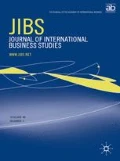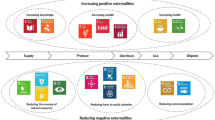Abstract
This paper explores how climate change affects multinational enterprises (MNEs), focusing on the challenges they face in overcoming liabilities and filling institutional voids related to the issue. Climate change is characterized by institutional failures, because there is neither an enforceable global agreement nor a market morality. Climate change is also a distinctive international business issue, as its institutional failures materialize differently in different countries. As governments are still highly involved, MNEs need to consider carefully their strategies to cope with non-market forces, including their embeddedness in multiple institutional settings. Using some illustrative examples of MNE responses to climate-related components in stimulus packages, we explore MNEs’ balancing act concerning their institutional embeddedness (or lack thereof) in home, host and supranational contexts as input for further research on the dynamics of MNE activities in relation to climate change.

Similar content being viewed by others
Notes
In the first phase of the EU trading scheme (2005–2007), EU member states provided industry with more emission allowances than required. As a consequence, firms were in compliance with the scheme by continuing business as usual. In the second phase (2008–2012), the number of allowances was reduced but the financial crisis slowed economic growth to such an extent that industry was again not facing a shortage of allowances.
We are grateful to one of the reviewers for alerting us to this point.
References
Belk, R. W., Devinney, T. M., & Eckhardt, G. 2005. Consumer ethics across cultures. Consumption, Markets and Culture, 8 (3): 275–289.
Boddewyn, J. J., & Brewer, T. L. 1994. International-business political behavior: New theoretical directions. Academy of Management Review, 19 (1): 119–143.
Bowie, N. E., & Vaaler, P. 1999. Some arguments for universal moral standards. In G. Enderle (Ed), International business ethics: Challenges and approaches: 160–173. Notre Dame, IN: University of Notre Dame Press.
Bradsher, K. 2009. China racing ahead of US in the drive to go solar. New York Times 25 August.
Cantwell, J., Dunning, J. H., & Lundan, S. M. 2010. An evolutionary approach to understanding international business activity: The co-evolution of MNEs and the institutional environment. Journal of International Business Studies, 41 (4): 567–586.
Christmann, P. 2004. Multinational companies and the natural environment: Determinants of global environmental policy standardization. Academy of Management Journal, 47 (5): 747–760.
Crooks, E. 2009. GE attacks protection of green industries. Financial Times 19 October.
Dean, T. J., & McMullen, J. S. 2007. Toward a theory of sustainable entrepreneurship: Reducing environmental degradation through entrepreneurial action. Journal of Business Venturing, 22 (1): 50–76.
Donaldson, T., & Dunfee, T. W. 1994. Toward a unified conception of business ethics: Integrative social contracts theory. Academy of Management Review, 19 (2): 252–284.
Dunning, J. H. 2009. Location and the multinational enterprise: John Dunning's thoughts on receiving the Journal of International Business Studies 2008 Decade Award. Journal of International Business Studies, 40 (1): 20–34.
Dunning, J. H., & Lundan, S. M. 2008. Multinational enterprises and the global economy (2nd edn). Cheltenham, UK: Edward Elgar.
Eden, L., & Miller, S. R. 2004. Distance matters: Liability of foreignness, institutional distance and ownership strategy. In M. Hitt & J. Cheng (Eds), Advances in international management: 187–221. New York: Elsevier.
Edgecliffe-Johnson, A. 2009. Siemens in US marketing drive. Financial Times 15 September.
Frynas, J. G., Mellahi, K., & Pigman, G. A. 2006. First mover advantages in international business and firm-specific political resources. Strategic Management Journal, 27 (4): 321–345.
Gereffi, G., Humphrey, J., & Sturgeon, T. 2005. The governance of global value chains. Review of International Political Economy, 12 (1): 78–104.
Henisz, W. J. 2003. The power of the Buckley and Casson thesis: The ability to manage institutional idiosyncracies. Journal of International Business Studies, 34 (2): 173–184.
Hillman, A. J., & Hitt, M. A. 1999. Corporate political strategy formulation: A model of approach, participation, and strategy decisions. Academy of Management Review, 24 (4): 825–842.
Hoffman, A. J 2005. Climate change strategy: The business logic behind voluntary greenhouse gas reductions. California Management Review, 47 (3): 21–46.
IPCC. 2007. Climate change 2007. The physical science basis – Contribution of working group I to the fourth assessment report of the IPCC. Cambridge, MA: Cambridge University Press.
Johanson, J., & Vahlne, J. -E. 2009. The Uppsala internationalization process model revisited: From liability of foreignness to liability of outsidership. Journal of International Business Studies, 40 (9): 1411–1431.
Jones, T. M. 1995. Instrumental stakeholder theory: A synthesis of ethics and economics. Academy of Management Review, 20 (2): 404–437.
Khanna, T., & Palepu, K. 1997. Why focused strategies may be wrong for emerging markets. Harvard Business Review, 75 (4): 41–51.
Khanna, T., Palepu, K. G., & Sinha, J. 2005. Strategies that fit emerging markets. Harvard Business Review, 83 (6): 63–76.
Kolk, A. 2010. Social and sustainability dimensions of regionalization and (semi)globalization. Multinational Business Review, 18 (1): 51–72.
Kolk, A., & Mulder, G. 2011. Regulatory uncertainty and opportunity seeking: The case of clean development. California Management Review, 54 (1): 88–106.
Kolk, A., & Pinkse, J. 2007. Multinationals’ political activities on climate change. Business & Society, 46 (2): 201–228.
Kolk, A., & Pinkse, 2008. A perspective on multinational enterprises and climate change: Learning from ‘an inconvenient truth’? Journal of International Business Studies, 39 (8): 1359–1378.
Kolk, A., & Van Tulder, R. 2005. Setting new global rules? TNCs and codes of conduct. Transnational Corporations, 14 (3): 1–27.
Kostova, T., Roth, K., & Dacin, M. T. 2008. Institutional theory in the study of multinational corporations: A critique and new directions. Academy of Management Review, 33 (4): 994–1006.
Lenway, S. A., & Murtha, T. P. 1994. The state as strategist in international business research. Journal of International Business Studies, 25 (3): 513–535.
Levy, D. L., & Egan, D. 2003. A neo-Gramscian approach to corporate political strategy: Conflict and accommodation in the climate change negotiations. Journal of Management Studies, 40 (4): 803–829.
Lorenzoni, I., Nicholson-Cole, S., & Whitmarsh, L. 2007. Barriers perceived to engaging with climate change among the UK public and their policy implications. Global Environmental Change, 17 (3–4): 445–459.
Luce, 2009. Wind energy stimulus dollars spent overseas. Financial Times 30 October.
Lundan, S. M. 2010. What are ownership advantages? Multinational Business Review, 18 (2): 51–69.
Maguire, S., Hardy, C., & Lawrence, T.B 2004. Institutional entrepreneurship in emerging fields: HIV/AIDS treatment advocacy in Canada. Academy of Management Journal, 47 (5): 657–679.
Milfont, T. L 2010. Global warming, climate change and human psychology. In V. Corral-Verdugo, C. H. García-Cadena, & M. Frías-Arment (Eds), Psychological approaches to sustainability: Current trends in theory, research and practice: 19–42. Hauppauge, NY: Nova Science Publishers.
Milne, 2009. Europe looks to lead green revolution. Financial Times 22 November.
Murtha, T. P., & Lenway, S.A 1994. Country capabilities and the strategic state: How national political institutions affect multinational corporations’ strategies. Strategic Management Journal, 15 (S2): 113–129.
Nilsson, A., von Borgstede, C., & Biel, A. 2004. Willingness to accept climate change strategies: The effect of values and norms. Journal of Environmental Psychology, 24 (3): 267–277.
North, D. C. 1994. Economic performance through time. American Economic Review, 84 (3): 358–368.
Oliver, 2010. South Korea invests in renewables. Financial Times 23–24 January.
Peng, M. W., Wang, D. Y. L., & Jiang, Y. 2008. An institution-based view of international business strategy: A focus on emerging economies. Journal of International Business Studies, 39 (5): 920–936.
Pernick, R., Wilder, C., & Winnie, T. 2010. Clean tech job trends 2010. San Francisco, CA: Clean Edge.
Pinkse, J., & Kolk, A. 2009. International business and global climate change. London: Routledge.
Ramachandran, J., & Pant, A. 2010. The liabilities of origin: An emerging economy perspective on the costs of doing business. In T. M. Devinney, T. Pedersen, & L. Tihanyi (Eds), The past, present and future of international business and management (Advances in international management, Vol. 23): 231–265. New York: Emerald.
Siegel, J. I., Pyun, L. S., & Cheon, B. Y. 2010. Multinational firms, labor market discrimination, and the capture of competitive advantage by exploiting the social divide. Strategy Unit Working Paper 11-011, Harvard Business School.
Spencer, J. W., Murtha, T. P., & Lenway, S. A. 2005. How governments matter to new industry creation. Academy of Management Review, 30 (2): 321–337.
Stern, N. 2006. The economics of climate change: The Stern review. Cambridge, MA: Cambridge University Press.
Sun, P., Mellahi, K., & Thun, E. 2010. The dynamic value of MNE political embeddedness: The case of the Chinese automobile industry. Journal of International Business Studies, 41 (7): 1161–1182.
Sydow, J., Schreyögg, G., & Koch, J. 2009. Organizational path dependence: Opening the black box. Academy of Management Review, 34 (4): 689–709.
Uzzi, B. 1997. Social structure and competition in interfirm networks: The paradox of embeddedness. Administrative Science Quarterly, 42 (1): 35–67.
Verbeke, A. 2009. International business strategy. Cambridge, MA: Cambridge University Press.
Verbeke, A., & Yuan, W. 2010. A strategic management analysis of ownership advantages in the eclectic paradigm. Multinational Business Review, 18 (2): 89–108.
Zaheer, S. 2002. The liability of foreignness, redux: A commentary. Journal of International Management, 8 (3): 351–358.
Author information
Authors and Affiliations
Corresponding author
Additional information
Accepted by Alain Verbeke, Area Editor, 26 October 2011. This paper has been with the authors for three revisions.
Rights and permissions
About this article
Cite this article
Pinkse, J., Kolk, A. Multinational enterprises and climate change: Exploring institutional failures and embeddedness. J Int Bus Stud 43, 332–341 (2012). https://doi.org/10.1057/jibs.2011.56
Received:
Revised:
Accepted:
Published:
Issue Date:
DOI: https://doi.org/10.1057/jibs.2011.56




